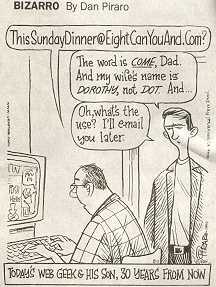

Far be it from me to compete with Seymour
Papert. Since his connected
family (my name of choice) was made public long ago, I have little
choice other than to pick a similar, but not identical title for this column.
Of course his title didn't refer to a specific family, but instead to an
examination of how computers can be integrated into the family setting
and help generate positive familial interaction. My title refers to a more
modest goal: a case study, if you will, of the internet's effect and influence
on one family. Whose? Well, mine, of course.
A year and a half ago I took a glimpse into
the role our computer plays in our family life. Much has changed since
then, mostly because the boys, as they grow older, want to use the computer
more and more. But I don't intend a similar sort of examination this time,
but rather a screen shot, a frozen moment in time, during which our internet
connection became central to our lives: the second half of February, 1999,
during which Tzippi and Hila traveled to Canada for a family visit.
It's not that we haven't been an online family
since well before that visit. Though for various reasons
our family web pages are dormant and even inaccessible, we've been an online
family for about four years, and the web and e-mail have been quite central
not only to our communication, but to the continually growing family archives
as well.
But for pretty much all of that time we
meant me. I not only conceived and executed the web pages, I was
also the one who used the e-mail. But Tzippi's trip changed that. First,
the trip was decided upon at very short notice, and we were in need of
quick contact with her brother in Toronto. Suddenly, instead of hearing
a complaint when I'd turn the computer
on after putting the kids to sleep, I'd discover, upon getting up from
their beds and leaving their room, that it was already on, waiting for
me to connect so that we could send or check mail. And finding it hard
to conceive not seeing Hila for ten full days, I also conditioned my agreeing
to the trip on Tzippi's brother installing ICQ, and on his getting his
hands on a digital camera by which he could send photos every day.
The ICQ came in handy before the trip, though
we discovered that though I'm online through much (too much) of the day,
we were hardly ever online at the same time. During the trip itself we
communicated via ICQ only once, but had almost daily e-mail contact, and
I got photographs about every two days. Interestingly enough, we only spoke
on the telephone once.
While Tzippi and Hila were away, Avigail, Mark's
daughter, came to visit for Shabbat, and this visit also offered us an
opportunity to see how connected, perhaps dependent on the internet, we
are. Because of the nature of the program she's on, in its early stages,
it was actually easier to contact Avigail via e-mail than it was by phone.
Directions on how to get to the bus stop closest to our home were forwarded
to her verbally by phone, but in the end they apparently didn't reach her
clearly enough. Thus, though I waited at the bus stop at the agreed upon
time, she didn't step off the bus. Nor off the next bus. Ultimately, though
it wasn't a determining factor in finding her, the internet
played a significant role in this adventure as well.
And when Tzippi and Hila's trip was over, the
check list of our internet based correspondence was rather comprehensive
for a ten day trip:
That's it for this edition. Reactions and suggestions
can be sent to:
back to the Boidem Contents Page
Return to Communications & Computers
In Education - Main Page
From the Boidem -
March 22, 1999*: Another connected
family
an occasional column on computers and information technologies in everyday
life
And just so that nobody gets the impression that posting
an
entire summer schedule
only happens in the comics....
We're far from the most connected family around. I've sometimes even been
known to get through an entire 24 hour period without checking my e-mail.
Perhaps luckily the kids are still small enough not to take an active interest
in their father's occupation and pre-occupation. Though occasionally we
have difficulties communicating, it's not due to congestion of the phone
lines, incorrect addressing, or insufficient band width. Most of our communicating
is still done face to face, as well it should. I expect my kids to be technologically
proficient, but I certainly hope they'll have communication skills that
go beyond the ability to click on a mouse or send off an e-message with
only a few key strokes. A connected family doesn't only mean that everyone
uses e-mail.
